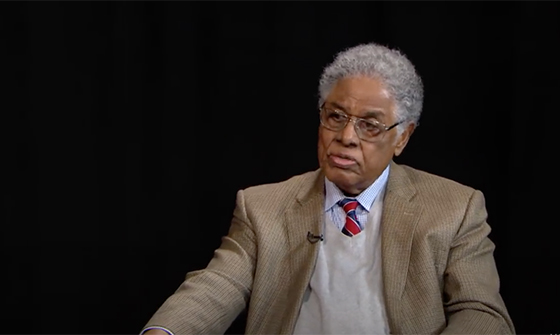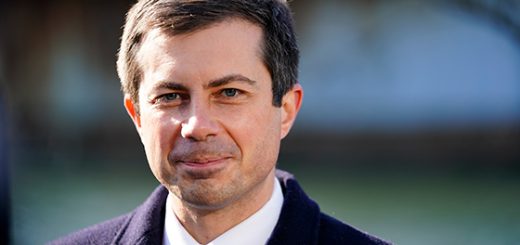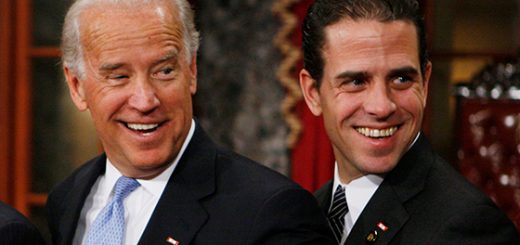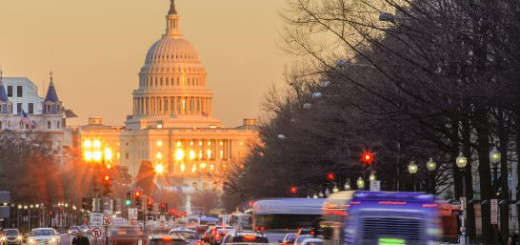No solutions.

Dr. Thomas Sowell appearing on the Hoover Institution’s “Uncommon Knowledge” with Peter Robinson. (YouTube screen capture.)
Dr. Thomas Sowell, economist, author and fellow at the Hoover Institution at Stanford University, once said that a core tenet of conservatism is that in many aspects of life there are no solutions, only trade-offs. He also once said, “At the heart of the social vision prevalent among contemporary intellectuals is the belief that there are ‘problems’ and ‘solutions.’”
I believe that Dr. Sowell is right as those assertions apply to the coronavirus.
Early this year, we became aware of an all-new virus emanating from China that was causing illness in humans. As the virus began to spread, people around the world began to get sick. For most who were sickened, the illness ranged from a nuisance “cold” to a particularly unpleasant flu. But for some, the symptoms were acute and death was a plausible outcome. It was feared that the numbers of those acute cases would overwhelm the local healthcare capacity. New York City is the prime example in the United States.
Projecting a situation idiosyncratic to New York across an entire continent and onto every city, county, village and burg in America, government at every level, with a big P/R push by the media, began taking steps to limit ordinary daily human interactions. This was done in order to slow the spread of the disease – or more accurately – space that spread out over a longer time so as to avoid those in need of hospitalization all showing up at once. They called it, “flattening the curve.”
Those steps effectively stopped the American economy. “Non-essential” businesses were made to shut down. Schools were closed. Sporting events were canceled. Weddings, church services and even funerals were prohibited.
The effect on the American economy was profound.
At this writing, 30 million Americans who were gainfully employed as recently as St. Patrick’s Day are now without work. U.S. unemployment, only weeks ago at the lowest levels in half a century, now stands at levels reminiscent of the Great Depression. Between Easter and Memorial Day, the United States Treasury will have borrowed more than $3 trillion.
All over the country small businesses are closing or hanging by a thread. Retail landlords are being asked by tenants to forego rent even as the landlords themselves face bankruptcy. Speaking of bankruptcy, some of America’s biggest brand names have or will soon file – among them Hertz and Neiman-Marcus.
Most significant, but less appreciated than it should be, government at every level – with no operation of any legislature or really any semblance at all of representative government – assumed micro-level control of our daily lives.
In Texas, county judges decided for themselves what constituted an essential business. While most did so in a good faith manner, it is nevertheless worth saying that if a business is the source of an owner’s livelihood, if the business provides a roof over his family’s head, food on his table, the means by which to educate his children and to make provision for his eventual old age; and if it does those same things for the workers that the business employs; it is, by the very definition of the word, an ‘essential’ business.
All of this to say that “re-opening” the American economy is not optional. And it certainly cannot devolve into a favor to be granted out of the benevolence of elected officials who have seized upon an extraordinary situation to transform themselves into overlords.
In Smith County, Texas as I write this, there are 66 active cases of COVID-19 in a population of 233,000. That works out to less than three one-hundredths of one percent.
If that incidence were 35 times worse, it would still leave 99 percent of the population unscathed. In this part of the world, the chances of any given citizen contracting COVID-19 are very low. But it’s not zero and for many, particularly for people in policy-making positions, that isn’t acceptable.
There won’t come a day soon when there are no new cases. A vaccine is a long way off, assuming one ever comes at all. Yet we must get business – all business – back on its feet anyway.
It all constitutes a ‘problem’ for which there is no ‘solution.’ The potential for the spread of disease must be weighed against the certainty of economic ruin. It’s the very sort of trade-off of which Dr. Sowell so wisely, and so presciently, spoke.








“Projecting a situation idiosyncratic to New York across an entire continent and onto every city?”
Criticizing The Dear Leader?
No.
Criticizing the New York-based media for hyperventilated coverage of a problem that was uniquely acute in a small part of the country. That coverage, tinged with their now undeniable, visible-to-the-naked-eye desire to damage the Trump presidency, served to make it politically impossible to manage the problem more conservatively in the rest of the country.
The Media didn’t order shutdowns, and governors’ don’t write the rules for “an entire continent,” or even every city in their own states.
You must have missed the words, “politically impossible” in my reply to you. And you must have somehow read words in my piece or in my reply that I never wrote. I never said that governors write rules for an entire continent. I never said that the media ORDERED anything.
The piece is a bit more nuanced than you apparently appreciate. It, and my previous reply, say in sum that the hair-on-fire reporting from the New York-based media served, in fact, to create a charged political environment across the entire continent. That phenomenon led to reactions by governors, county judges and mayors that were, in many cases, disproportionate to the actual risk in their particular jurisdictions.
I’ve seen soreheads elsewhere in Social Media lionize this Sowell similarly, construing his actual words to story du jour. what, specifically, HAD he said/written about the pandemic?
Paul, do not expect a sensible reply to your response to an illogical reply from him. As much as you may try, it will never be possible to have a logical dialogue with someone who chooses to use straw man arguments and irrelevant links to support a position. He still refuses to decide on the wisdom of Governor Cuomo to REQUIRE Covid-19 patients to be admitted into the nursing homes and long-term care facilities in New York. If one cannot opt on that inhumane decision, be very suspicious of that person’s motives.
Could not agree with you more! Thanks.
Dr. Sowell is a true thinker, and therefore has been a wise predictor of the folly of expecting every problem to have a solution. This Covid-19 pandemic is apparently a deliberate problem created by the Communist Chinese government to retaliate and save face for the humiliation suffered in the last year. Not only do they have increasing pressure from Hong Kong and other domestic issues, but also, President Trump has demonstrated the “Art of the Deal” in addressing the huge trade imbalance. This calculated strategy definitely has some risks, but releasing this virus on the rest of the world could have massive benefits in the quest for world domination. For them, it was worth the risks, and certainly was a successful “dry run” for something even more devastating, if the need arises. No, this problem does not have a definitive solution, but it could be a problem that can be managed successfully by a unified nation. There is a strong possibility that history will record this period as the biggest hoax ever perpetrated on our country. It is shameful that some Americans are rooting for this virus to be their key to power. All Americans, regardless of political party, need to come together as “One Nation Under God” as we have in managing so many previous “problems”.
Excellent piece Mr. Gleiser. You are absolutely correct that it is imperative that America be open for business today, not tomorrow or some later ambiguous unknown date which seems to have moving goalposts if left to democrats. President Trump and Governor Abbott are for reopening America now, doing it safely. While at the same time being very aware that we have such a document called The Constitution which is both a statement and guarantee for all time of our Rights that are God given. FREEDOM as our Founding Fathers knew, is the cornerstone of our republic.
As for addressing the invisible enemy i.e. corona virus which was caused by communist China, though not a physician myself, there is much evidence that three medicines/supplement used together have brought wellness if not a cure for many. Those are… Hydroxychloroquine, Azithromycin, and Zinc Sulfate when prescribed taken together as have been noted. In any event, the United States cannot wait for a so-called miracle vaccine which in fact may never come. In my humble opinion, therapeutic drugs like the above and others being researched now are the answer. As you have said, the lives of millions people and all they have worked for cannot be allowed to be further decimated by bureaucrats who can only see a micro not a macro view.
I for one give President Trump and Governor Abbott the highest of marks in addressing COVID-19. No other individuals could have done better. I shall be casting my vote for the Republican side from the top all the way down ballot, as the hapless democrats led by, if you can even call it that, by Biden, or no matter who is their candidate, are unequivocally wrong for America.
It is time for President Trump to shift the virus-centric, economy-killing, curve-flattening bias that has paralyzed this country for the last two months to a SAFE model that has been very successfully practiced by Governor Ron DeSantis of Florida. The DeSantis use of common sense to protect the elderly FIRST (that are the most vulnerable population) has resulted in a very LOW death rate. He is now rapidly returning the State to Freedom from the nationally enforce draconian lock-down and continually being practiced by the Tyranny Hungry Blue States that have had an extremely HIGH death rate from the virus due to their incompetence.
The TRUE consequences of the virus-centric fear tactics have never been fully examined with respect to the non-virus collateral deaths/illnesses that were deliberately suppressed due to the shutdown of normal medical services, not to mention assessment of the horrible financial damage to millions of families and small businesses as we reach 30 million unemployed. We MUST resuscitate our economy and protect/care for the elderly AT THE SAME TIME without letting the Leftist Fear Machine continue to ruin the country and usher in a Marxist dependent society being orchestrated by the Malevolent Democrats and their Media Mob partners. The Freedom battle for the SOUL of the country is now underway. It has been forced on us by the Constitution HATING Leftists that have proudly exposed themselves by EXPLOITING the pandemic to power us into submission and dependency.
In the interests of promoting a Liberty dialogue, I would like for the carriers of the newly discovered “Hateful Conscience” (HC) virus, to consider the logical conclusions of a Conservative, namely Kevin Sorbo. He exhibits a healthy “Loving Conscience” based on the superiority of Liberty over the sickening “Compassionate” Tyranny held by victims of the HC virus that is discussed in the excerpt from the following link.
https://www.cnsnews.com/index.php/blog/craig-bannister/actor-kevin-sorbo-wake-people-when-state-does-these-things-its-not-about-your
Actor-Producer Kevin Sorbo is urging Americans to “Wake up” and to see the dangers and hypocrisy of how “the State” is exploiting the corona virus pandemic to grab power and limit freedom.
“Everybody please WAKE UP!!
When the State tells you it’s safe to go to Home Depot to buy a sponge but dangerous to go and buy a flower and when the State shuts down millions of private businesses but doesn’t lay off a single government employee, it’s not about your health.
When the State prevents you from buying cucumber seeds because it’s dangerous, but allows in person lottery ticket sales and When the State tells you it’s dangerous to go golf or fish alone but they can get make up and hair done for 5 TV appearances, it’s not about your health.
When the state puts you IN jail for walking in a park with your child because it’s too dangerous but let’s criminals OUT of jail for their health and when the state tells you it’s dangerous to get treated by a doctor yet says a liquor stores essential it’s not about your health!
When the State lets you go to the grocery store or hardware store but is demanding mail-in voting, ITS NOT ABOUT YOUR HEALTH.
WAKE UP PEOPLE — If you think this is all about your health you’re mistaken! Please open your eyes! Stop being lead like blind sheep.”
I am really curious Mr. Cooke, and I mean no disrespect here. How does one from Rhode Island take an interest in East Texas affairs? One of my best friends moved to Rhode Island due to a super job offer in Boston. I, myself have spent 4 years in the Boston area and do understand a piece; albeit, small piece of New England. Hard for a 5th generation pure blood Texan to completely understand New England; much less Rhode Island which is smaller than the county I grew up in.
As I stated before, Dr. Thomas Sowell and Dr. Walter Williams are people I read and follow due to their common sense on all subject economic and taxation. Their words are generally true and come from two gentlemen who grew up on hard work, education, and sheer will to achieve. Americana to the max. I could care less what color your skin is; I want to know your attitude and will toward our Republic. You call President Trump, “Dear Leader”. O.K., that is fine; I will not tell you what I called the last person to pretend to be the President. Mr. Gleiser would kick me off here. But, there is one aspect I do know and recognize in government; Marxist and Totalitarianism. President Trump is neither; Obama was both. The Democrats are both; no argument can change that fact. So, please, if you will answer my question. Why does a person from New England take such an interest in my small part of the country?
RE “How does one from Rhode Island take an interest in East Texas affairs?”
“Affairs?” She swore she was single!
But seriously…
I should defer to Mr. Gleiser’s explanation about my interest in the region generally.
Apropos my presence on this blog, I’ll reiterate the explanation I posted a while back: I’m “The Heel,” in WWE parlance.
As my colleague Jesse Ventura explained, pro wrestling is ballet. And there are two dancers: “The Baby” (sometimes referred to as “The Face”), the hero; and The Heel, the villain who riles-up the crowd.
The standard plot line is that The Baby takes a drubbing, and it looks like The Heel will win…UNTIL The Baby’s last-minute comeback. And the crowd goes wild.
“I was always The Heel,” Gov. Ventura grinned.
Thank you for clicking
Funny. One more question Mr. Heel. How did you discover this site?
Granted, everyone needs someone to challenge them and keep them informed and sharp on subject matter. Some of us simply love a good debate.
I bet you are really a Trump supporter but keep your MAGA hat on the top shelf of your closet.
This pandemic is the latest catastrophe the democrats can use against Trump. None of the others have worked, and some are coming back to bite them in the ass. The conspiracy continues with all the various experts predicting the future based on current test data and Trump’s response. If Trump were to come forth with a cure for the disease it wouldn’t be enough. Stories of individuals warning of a scenario just like this were ignored, and offers of assistance to mitigate the effects are also being ignored. All of this to say: government can’t, won’t, or shouldn’t fix everything. Evidence abounds that government usually makes it worse! The fact so many people are waiting for the government now should be a problem. But the business savvy of Trump allows him to see that saving the country means making some hard decisions, most of which will be unpopular with somebody! Some of your columns have discussed the difference between knowledge and experience. Hopefully we are gaining BOTH with this pandemic.